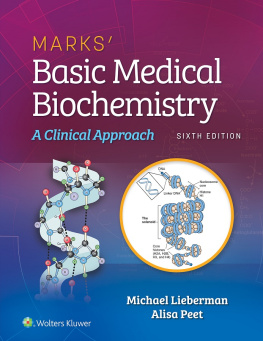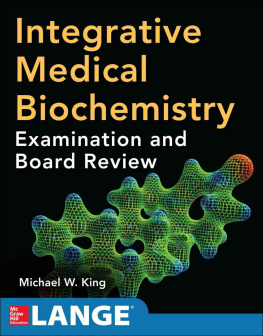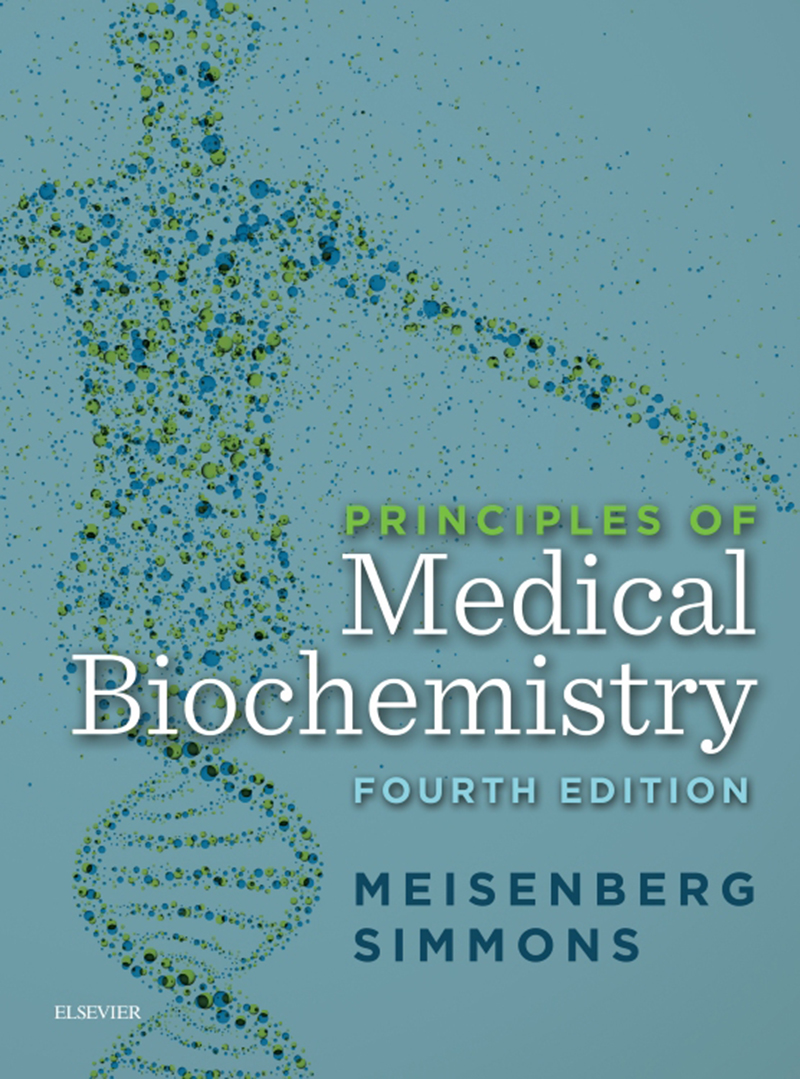Principles of Medical Biochemistry
Fourth Edition
Gerhard Meisenberg, PhD
Department of Medical Biochemistry, Ross University School of Medicine, Roseau, Commonwealth of Dominica, West Indies
William H. Simmons, PhD
Department of Molecular Pharmacology and Therapeutics, Loyola University School of Medicine, Maywood, Illinois

Copyright

1600 John F. Kennedy Blvd.
Ste 1800
Philadelphia, PA 19103-2899
Principles of Medical Biochemistry, FOURTH EDITION
Copyright 2017 by Elsevier, Inc. All rights reserved.
ISBN: 978-0-323-29616-8
No part of this publication may be reproduced or transmitted in any form or by any means, electronic or mechanical, including photocopying, recording, or any information storage and retrieval system, without permission in writing from the publisher. Details on how to seek permission, further information about the Publishers permissions policies and our arrangements with organizations such as the Copyright Clearance Center and the Copyright Licensing Agency, can be found at our website: www.elsevier.com/permissions.
This book and the individual contributions contained in it are protected under copyright by the Publisher (other than as may be noted herein).
Notices
Knowledge and best practice in this field are constantly changing. As new research and experience broaden our understanding, changes in research methods, professional practices, or medical treatment may become necessary.
Practitioners and researchers must always rely on their own experience and knowledge in evaluating and using any information, methods, compounds, or experiments described herein. In using such information or methods they should be mindful of their own safety and the safety of others, including parties for whom they have a professional responsibility.
With respect to any drug or pharmaceutical products identified, readers are advised to check the most current information provided (i) on procedures featured or (ii) by the manufacturer of each product to be administered, to verify the recommended dose or formula, the method and duration of administration, and contraindications. It is the responsibility of practitioners, relying on their own experience and knowledge of their patients, to make diagnoses, to determine dosages and the best treatment for each individual patient, and to take all appropriate safety precautions.
To the fullest extent of the law, neither the Publisher nor the authors, contributors, or editors assume any liability for any injury and/or damage to persons or property as a matter of products liability, negligence or otherwise, or from any use or operation of any methods, products, instructions, or ideas contained in the material herein.
Previous editions copyrighted 2012, 2006, and 1998
Library of Congress Cataloging-in-Publication Data
Names: Meisenberg, Gerhard, author. | Simmons, William H. (Medical scientist), author.
Title: Principles of medical biochemistry / Gerhard Meisenberg, William H. Simmons.
Description: Fourth edition. | Philadelphia, PA : Elsevier, [2017] | Includes bibliographical references and index. | Description based on print version record and CIP data provided by publisher; resource not viewed.
Identifiers: LCCN 2016031838 (print) | LCCN 2016030780 (ebook) | ISBN 9780323391900 (Online) | ISBN 9780323296168 (pbk. : alk. paper)
Subjects: | MESH: Biochemical Phenomena | Molecular Biology
Classification: LCC QP514.2 (print) | LCC QP514.2 (ebook) | NLM QU 34 | DDC 612/.015dc23
LC record available at https://lccn.loc.gov/2016031838

Content Strategist: Lauren Willis
Content Development Specialist: Rebecca Gruliow
Publishing Services Manager: Hemamalini Rajendrababu
Project Manager: Dr. Atiyaah Muskaan
Design Direction: Brian Salisbury
Marketing Manager: Melissa Darling
Cover Art: Shutterstock
Printed in China
Last digit is the print number: 9 8 7 6 5 4 3 2 1
Preface
Gerhard Meisenberg, PhD
William H. Simmons, PhD
It is rumored that among students embarking on a course of study in the medical sciences, biochemistry is the most common cause of pretraumatic stress disorder: the state of mind into which people fall in anticipation of unbearable stress and frustration. No other part of their preclinical curriculum seems as abstract, shapeless, unintelligible, and littered with irrelevant detail as does biochemistry. This prejudice is understandable. Biochemistry is less intuitive than most other medical sciences. Even worse, it is a vast field with an ever- expanding frontier. From embryonic development to carcinogenesis and drug action, biochemistry is becoming the ultimate level of explanation.
This fourth edition of Principles of Medical Biochemistry is yet another attempt to impose structure and meaning on the blooming, buzzing confusion of this runaway science. This text is designed for first-year medical students as well as veterinary, dental, and pharmacy students and students in undergraduate premedical programs. Therefore, its aim goes beyond the communication of basic biochemical facts and concepts. Of equal importance is the link between basic principles and medical applications. To achieve this aim, we enhanced this edition with numerous clinical examples embedded in the chapters that illustrate the importance of biochemistry in medicine.
Although biochemistry advances at a faster rate than most other medical sciences, we did not match the increased volume of knowledge by an increased size of the book. The day has only 24 hours, the cerebral cortex has only 30 billion neurons, and students have to learn many other subjects in addition to biochemistry. Rather, we tried to be more selective and more concise. The book is still comprehensive in the sense that it covers most aspects of biochemistry that have significant medical applications. However, it is intended for day-to-day use by students. It is not a reference work for students, professors, or physicians. It does not contain all a physician ever needs to know about biochemistry. This is impossible to achieve because the rapidly expanding science requires new learning (and unlearning) of received wisdom on a continuous basis.
This book is evidently a compromise between the two conflicting demands of comprehensiveness and brevity. This compromise was possible because medical biochemistry is not a random cross-section of the general biochemistry that is taught in undergraduate courses and PhD programs. Biochemistry for the medical professions is physiological chemistry: the chemistry needed to understand the structure and functions of the body and their malfunction in disease. Therefore, we pay little attention to topics of abstract theoretical interest, such as three-dimensional protein structures and enzymatic reaction mechanisms, but we give thorough treatments of medically important topics such as lipoprotein metabolism, mutagenesis and genetic diseases, the molecular basis of cancer, nutritional disorders, and the hormonal regulation of metabolic pathways.







